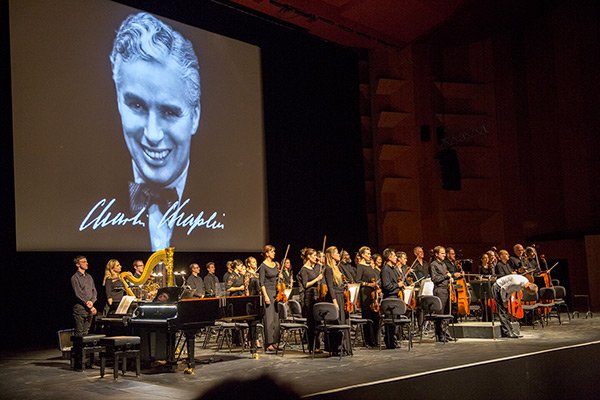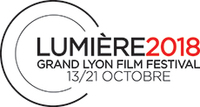Frank Strobel
Interview with the conductor of The Gold Rush cine-concert
Posté le 18.10.2018 à 18h45
An auditorium of more than 2.000 people with broad smiles on their faces – that is what conductor Frank Strobel and the Orchestre National de Lyon achieved at the sold-out cine-concert performance of Charlie Chaplin's Gold Rush in Lyon on Wednesday. We met the conductor, admired not only for his concert repertoire of the Classical and Romantic eras and the 20th century, but also famous the world over for taking silent movies into opera houses and concert halls.

Copyright Institut Lumière / Bastien Sungauer
Festival Lumière: Frank Strobel, you are a pioneer when it comes to putting music to film, a leading actor in the cine-concert genre. Where does your passion stem from?
Frank Strobel: I grew up in the cinema, my father was one of the co-founders of the Munich International Film Festival, and I discovered music in films very early. It was the beginning of the1980's, and I found out that the way we often witnessed silent movies with music, with just a pianist, that wasn't the way it used to be done. In film palaces there used to be an orchestra, it was only in small cinemas in villages and suburbs that there was only a pianist or a pianist with a violinist, so this came as a surprise.
I came from the world of opera and for me, the silent film genre and music are very linked to opera, the way operas are told: music plays the same function, so I was very curious and tried to learn more.
In silent movies, there are no dialogues, there is no sound, all you hear with a cine-concert is the music, and all you see is the picture. With opera, of course, we have words but the music plays the same role as in silent movies: on the one hand, it carries the story, but on the other hand, it gives us the emotional background, tells us whether a character is happy or sad. The music doesn't just serve to illustrate the pictures but plays an essential role as it helps to tell the story. Later on, with the advent of sound, great film directors understood that music does more than illustrate what you see in the movie.
In the 70s and 80s, there was this idea that you should see silent films without music – that was a big mistake, because it was never meant to be that way. Music plays an essential role when it comes to the rhythm, the tempo of the movie. It was always totally clear that there would always be music, the combination of pictures and music is what makes the experience of the film. Without music, the tempo is not right.
Festival Lumière: The performance you gave was impressive. How do you get it so right?
Frank Strobel: To be honest, The Gold Rush is extremely complicated. The music and the picture are very closely linked.
A principle of mine is I don't use any technical help. I have a monitor in front of me to avoid having to look up at the screen and lose eye contact with the musicians. I work a lot with my eyes, the communication is silent but it's thanks to my movement, my face, my eyes, that they know what to do. So there are no timecodes on this monitor, as you would use during recordings for example. There is only the picture, because then you start to breathe with the film. I take the tempo of the movement of the characters and transfer it into the music. In my score, I have synchronisation points (« Chaplin stands up » or « Chaplin kisses Georgia » or « A bottle falls down »), telling me what is happening in the film at the exact position where they should be in the music. For this film, I have about 1.200 points, which help me anticipate in order to be perfectly synchronised. There are also points where we can breathe (« tempo rubato ») and go slightly slower or faster. That is the art of this genre: on the one hand you have to be very precise, but on the other you should still hear the music breathing.
I am the only one responsible for the synchronisation because the orchestra is sitting with its back to the screen. It is exhausting but galvanising for all of us - 96 minutes totally under electricity.
When I work with these movies, I always try to work not as a slave to the film, but to see it as a partner to myself and the orchestra. The film runs, it gives me a very definite structure, but it is always reliable because it never changes. In an opera, you never know what will happen with singers or a choir, because their performance is likely to change from one evening to another.
In the beginning, I was very critical of the digitalisation of film because a 35 mm is a 35 mm. With digitalisation you have a very clear, very pure picture, but it no longer breathes. With analog films, the picture was much more lively and human. Digital pictures are a bit colder, but when you have an orchestra on stage then you have the human touch.
Festival Lumière: How does it make you feel to see and hear the reactions from the audience ?
Frank Strobel: That's the genius of Chaplin, he was so full of humanity, always surprising in his storytelling. He really was a genius of the 20th century, he was all at once producer, actor, screenwriter and he wrote his own music.
This is a universal film, totally out of times, and what we experienced yesterday is wonderful, when you have these reactions coming from behind, when you hear the audience laughing. I have to say as a conductor and for the musicians it's what we love so much about these concerts, it's rare, we don't have that in classical concerts : 2.200 people laughing while we are playing, it's motivating. And we also have a lot of fun on stage, even if we have to concentrate very hard on what we are doing, we catch the atmosphere and the laughs coming from the the audience. And that's the reason I think orchestras love to play this kind of concert.
Lise Pedersen

